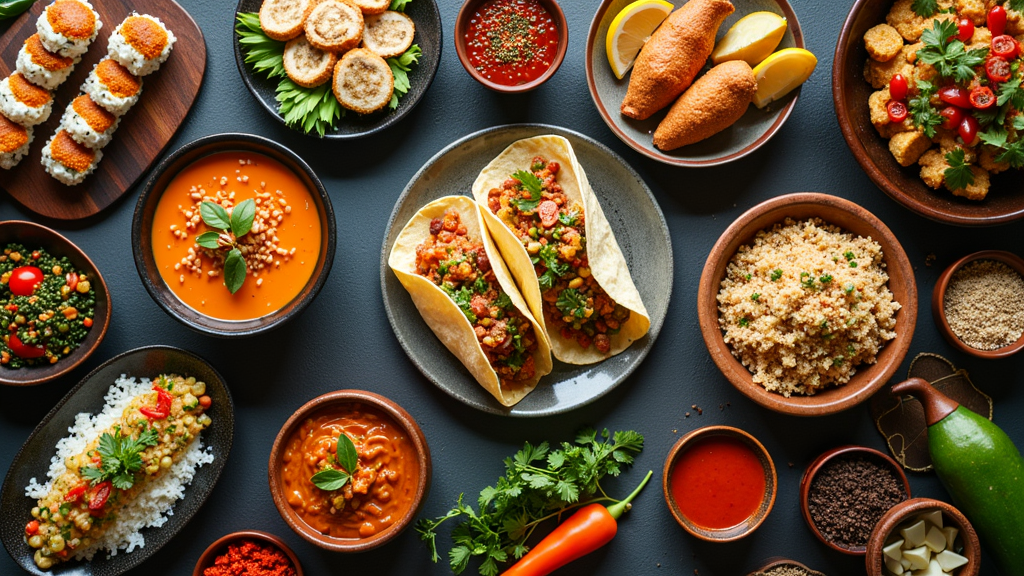Food is more than just fuel; it’s a passport to different cultures, histories, and experiences. Whenever I’m feeling restless or curious about the world, I turn to global cuisine as my ticket for discovery. With so many flavors, techniques, and stories wrapped up in every meal, exploring global cuisines offers a satisfying type of adventure. Even if we aren’t able to hop on a plane every weekend, food brings the world closer. And if you’re looking to make your passion for food pay off, there’s an easy way to travel, taste, and earn at the same time. I’ll walk you through not just what to eat and where, but also how you can turn your culinary adventure into a side hustle using free training and resources, including those at Wealthy Affiliate. Check out my favorite resource here for building a food blog or online food guide.

The Joy of Culinary Exploration
Eating food from around the world is a really fun way to experience new things. Every dish has a backstory: why it’s made a certain way, what flavors show up, and who’s sitting down to share it. Some of my best travel memories are tied to moments savoring a street food snack on a busy corner or sharing homemade bread at a family table far from home. Tasting new foods helps me get a sense of what life looks like somewhere else—even if I’m just sitting at my own kitchen table.
Travelers are often drawn to famous sights, but the local market or tiny lunch counter attracts a different type of crowd. That’s where the real pulse of a culture beats. Sampling dishes on the road means more than just eating. It’s about connecting with new people, picking up bits of the local language, and finding common ground one plate at a time.
Starting Your Global Food Adventure
Jumpstarting your own culinary adventure doesn’t need a giant budget or a packed suitcase. If you’re new to this, here’s how I recommend getting into it:
- Pick a Country or Region: Start with one place that grabs your interest, like Morocco, Thailand, or Ethiopia, and get curious about what’s eaten there.
- Research Local Dishes and Ingredients: Food blogs, documentaries, and cookbooks are super helpful here. Go beyond the most famous dishes and check out daily staples, snacks, and drinks.
- Visit Ethnic Markets and Restaurants: Track down a local market that sells international ingredients or try out a familyrun restaurant. Even if you’re shy to order something unfamiliar, most staff love giving tips if you’re honest about being new to the cuisine.
- Cook at Home: Trying a traditional dish in your own kitchen is a great way to get hands-on experience. You’ll learn about unique ingredients and classic cooking techniques along the way.
Keeping a food journal or sharing your discoveries online makes the experience even greater. If you want to share your adventure on a blog, free tools and communities at Wealthy Affiliate make it straightforward, even for beginners. Recording what moved you, which tastes surprised you, or which recipes challenged you adds a personal touch and can inspire others to join in.
Check Out: African Cuisine
African cuisine doesn’t always get the spotlight it deserves, but it has tons of eye-catching flavors and regional specialties. Every time I check out a new African recipe or eat at a place that focuses on the continent’s food, I’m reminded just how diverse Africa really is. There’s spicy jollof rice from West Africa, tangy injera and hearty stews from Ethiopia, or rich tagines packed with spices from North Africa. Flavors like berbere and suya spice, grains like millet, and creative use of local produce truly make African food one of my favorites to experience.
African food markets are super fun and full of energy. Walking through rows of plantains, cassava, and colorful spices makes you feel like you’re traveling with your senses. Even if a trip isn’t possible, there’s a bunch of amazing blogs and YouTube channels with step-by-step guides for classics like bobotie, egusi soup, or Moroccan harira. Cooking these dishes helps you appreciate not just the flavors, but the traditions and communities they’re tied to. Try inviting friends over and turn it into a night of crosscultural learning without leaving your kitchen.
Making Money on Your Culinary Adventure
One great thing about loving food and culture is that you can turn it into an income stream that supports your travels. Here’s how I’ve seen others—and myself—make it work:
- Start a Food Blog: Share recipes, restaurant guides, and stories about your food experiences. You don’t need to be a pro writer—being honest and excited about food connects you with readers. There are free training courses at Wealthy Affiliate that walk you through setting up a blog and even making money with ads, affiliate offers, or sponsored content.
- Teach Cooking Classes Online: Record yourself making tasty international dishes and offer lessons or tutorials on YouTube or Zoom. People love learning kitchen tricks from fellow food fans, not just professional chefs.
- Write Food Guides or Ebooks: Share your knowledge of different ingredients, restaurant reviews, or travel tips in a downloadable format people can buy or access for free with ads or affiliate links.
- Curate Food Tours: If you live in a city with awesome international eats, help visitors (or locals!) track down new favorites with a walking tour or digital food map. Sharing what you know saves others time and can earn you money.
Free training like what you’ll find at Wealthy Affiliate made a huge difference for me. Even when I started knowing nearly nothing about websites or marketing, there was a step-bystep guide and a friendly community to support me. These resources break down building a blog, networking, and even finding your first readers or partners, all for free.
Troubleshooting Common Culinary Travel Challenges
Any real adventure is going to include a few challenges. Learning to steer through them is part of what makes your stories meaningful and authentic:
- Dietary Restrictions: Allergies, religious rules, or picky eating can make trying new foods tricky. I try to pick up a few helpful phrases (“no peanuts,” “vegetarian,” “no pork”) and look up safe dishes ahead of time so I don’t get stuck.
- Budget Constraints: Eating out can be expensive, especially in touristy cities. I save cash by tracking down street food, local markets, and hostel kitchens. Cooking with friends or hosts also keeps costs low and helps me learn directly from locals.
- Finding Authentic Experiences: Tourist restaurants often water things down. I ask residents for advice, browse travel forums, or look for spots packed with locals—busy tables usually mean good food.
- Cooking Disasters: Not every recipe will come out perfectly, especially ones from other cultures. I keep my sense of humor and see every “fail” as part of the process. Sometimes, these “failed” experiments turn into new favorites or great blog material.
Dietary Restrictions
Every time I head somewhere new, I make sure to have a list of allergies and dietary needs ready in the local language, either in a translation app or on a card. That means fewer worries and much smoother meals. Snacks are also my safety net for hungry moments.
Budget Constraints
Experiencing food around the world shouldn’t drain your savings. Some simple tips: eat out just once a day, buy snacks or picnic foods from grocery stores or markets, and always ask your hosts for cheap eats advice. This way, you get the best bites without spending a fortune.
Finding Authentic Experiences
I steer clear of restaurants where tourists outnumber locals and look for busy places filled with residents—even if I have to use Google Translate to read the menu! Food tours guided by locals and recommendations from local bloggers will also set you up for success.
Cooking Disasters
Every cook knows that kitchen fails come with the territory, especially when using new spices or techniques. Instead of getting discouraged, I write about what went wrong or share a funny story—it keeps things real and gets awesome reactions from readers or fellow food fans.
Cooking can be trial and error, but improvement is always right around the corner. Every time you mess up, you learn something that helps you level up next time, making your next dish that much tastier and your stories that much richer.
Pro Tips for Global Food Explorers
I think the key to any successful food adventure is a blend of curiosity and preparation. Here are some tips to make the most of it:
Document the Details: Photos, flavor notes, and quick video clips help you relive those moments and give you awesome material for blogs and guides.
Join Cooking Classes: Online or in person, learning from someone who grew up with the food gives you the little secrets behind classic dishes that you can’t get from recipes alone.
Compare and Contrast: Try different versions of the same dish—like comparing hummus from three chefs or taste testing Ghanaian and Nigerian jollof rice. This adds a fun layer to exploring, and your readers or followers will love your insights.
Sharing what you experience can be just as rewarding as discovering it; resources like Wealthy Affiliate give you all the tools to get your stories to an audience, even if you’re new to blogging.
Baking, Cooking, or Tasting? Basic Tools for Food Travel
The right gear helps every food journey go smoothly. Here’s what I always keep handy whether I’m home or away:
- Travelfriendly Utensils: Compact forks, knives, spoons, and a reusable bowl can get you from street food lunches to hostel picnics easily.
- Spice Sampler: A tiny tin of my favorite spices (like peri peri, curry powder, za’atar) helps brighten up bland hostel dinners and puts a personal spin on any meal.
- Notebook or App: Jotting down standout dishes, taste notes, or chef tricks helps me remember what worked and what didn’t—plus, it’s perfect material for future blog posts.
- Decent Camera or Smartphone: Quality photos help tell a food story, make memories, and are a major asset for any online presence, whether you blog or just share with friends.
FAQ: Culinary Travel and Food Blogging
People often ask me these food adventure questions, so here are my go-to answers:
How do I find authentic food while traveling?
Ask locals, check where crowds are going, and follow recommendations from local bloggers. Stay away from places with menus in lots of languages or ones that push “real local food.”
Is it possible to make money documenting my food adventures?
Absolutely! Food blogging, teaching online cooking, and writing guides are proven ways to earn. Wealthy Affiliate offers tons of free tips and training to help you get started from scratch.
Are there online resources for learning about world cuisines?
You bet—there are cooking channels, foodbased podcasts, culinary travel blogs, and lively online communities. Wealthy Affiliate’s free training also covers blogging basics and networking with other food lovers.
Next Steps: Take Your Culinary Curiosity on the Road
Exploring global cuisine is a fantastic way to grow as a traveler and storyteller, and it’s even possible to build income by sharing your adventure. Free resources, like those at Wealthy Affiliate, help you get started with zero experience and no upfront cost. Whether you’re into African dishes, Asian street food, or Mediterranean flavors, a curious spirit and a bit of effort can take you far. Happy eating and may your next food adventure be your tastiest yet!
